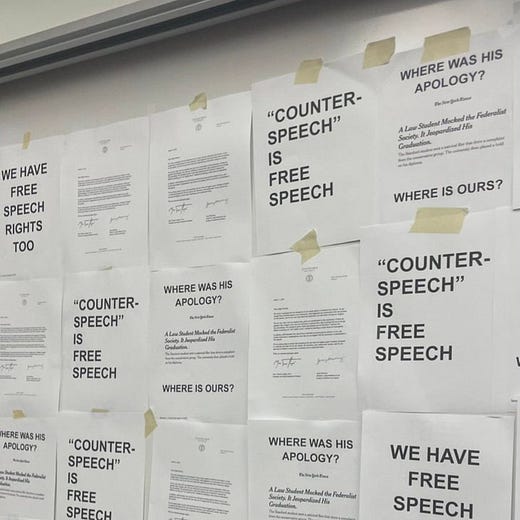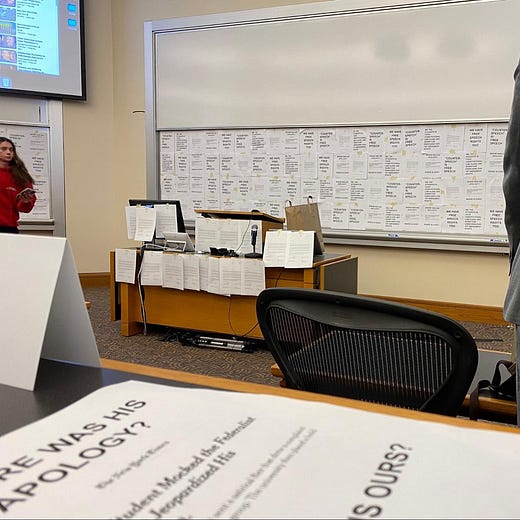E-Pluribus | March 14, 2023
Is knowledge power or a burden?; the Constitution could be the ultimate victim of the culture war; and why ESG initiatives are swallowing your savings.
A round-up of the latest and best writing and musings on the rise of illiberalism in the public discourse:
Shadi Hamid: You’re Better Off Not Knowing
Like the Jonathan Haidt piece we featured in yesterday’s E-Pluribus, Shadi Hamid’s latest essay in The Atlantic explores why well-informed progressives, particularly young women, are dealing with mental health issues. Hamid explains that information itself, or the consumption of political news in particular, could be to blame.
What the writer Sarah Haider calls “information addiction” is nothing short of an epidemic. In a quite literal sense, politics is making Americans sick. But the sole way to contract the illness is by seeking out the news and consuming large amounts of it. And that’s a choice. Haider chose differently, deciding to go news free for six months in late 2021 and early 2022. Having missed out on stories that were speculative, overhyped, or irrelevant, she reported being “saner, happier, and (surprisingly) more informed.” But does it make sense for other Americans, perhaps millions of them, to completely rethink their relationship to political information and knowledge? In a 2022 study, the political scientist Kevin Smith estimated that between 50 million and 85 million Americans suffer from politically induced fatigue, insomnia, loss of temper, and impulse-control problems. Moreover, 40 percent of his sample of American adults reported that politics was a “significant source of stress” in their lives, while 5 percent—which would translate to roughly 12 million people—reported suicidal thoughts due to politics.
[ . . . ]
However difficult it may be, Americans need to find ways to disengage from the constant assault of politics. In a culture where everything is “problematic” even if it’s not, the drumbeat of everyday political events too easily arouses worry, anger, and hopelessness. Indeed, focusing on supposed catastrophes, including those far out into the future, can have even more profound effects that are at once odd and unnatural. Remarkably, The New York Times’ Ezra Klein observed last year that the question he’s been asked more than any other in his public engagements is: “Should I have kids, given the climate crisis they will face?” This is the platonic ideal of catastrophic thinking. Klein’s interlocutors, among other things, are probably reading too much news.
If there were a way to consume the news without catastrophizing it, then that could be one path forward. But progressives in particular have trouble doing so. For them, to be aware of the ills of the world is to feel compelled to speak and act—or at least to feel. If we can’t all go news free—which is difficult in the world as it is—we can, at the very least, establish a truce with the news. Information and knowledge can be—and often are—quite great. But they are not unqualified goods. Sometimes ignorance is, in fact, bliss.
Read the full piece.
David French: Don’t Let the Culture War Degrade the Constitution
The state of California is trying to punish Walgreens for not dispensing birth control in 21 red states while Florida targeted Disney after the company objected to the so-called Don’t Say Gay law. Examples of state governments punishing political positions they don’t like continue to grow. Both red and blue states, David French argues in his New York Times column, are waging culture wars via public policy to the detriment of our rights and the Constitution.
The Constitution of the United States, properly interpreted, provides a marvelous method for handling social conflict. It empowers an elected government to enact even contentious new rules while protecting the most fundamental human rights of dissenting citizens. Political defeat is never total defeat. Losers of a given election still possess their basic civil liberties, and the combination of the right to speak and the right to vote provides them concrete hope for their preferred political outcomes.
But if a government both enacts contentious policies and diminishes the civil liberties of its current ideological opponents, then it sharply increases the stakes of political conflict. It breaks the social compact by rendering political losers, in effect, second-class citizens. A culture war waged against the civil liberties of your political opponents inflicts a double injury on dissenters: They don’t merely lose a vote; they also lose a share of their freedom.
[ . . . ]
In a nation as diverse as the United States, conflicts over values are inevitable, but our most basic civil liberties must remain inviolate. To govern otherwise both inflicts a grave injury on dissenting citizens and violates the letter and spirit of the Constitution itself. Our right to speak, much less to parent, should not be contingent on our ability to gain political control.
The much better course for our democracy is to uphold a legal corollary to the golden rule: Defend the rights of others that you would like to exercise yourself.
Read it all.
Rupa Subramanya: The ‘Giant Grift’ That Swallowed Wall Street—and Maybe Your Savings
When investment funds adopt an ESG (environmental, social, and governance) framework in an effort to demonstrate long-term, socially responsible investment strategies, is it all just a scam? At The Free Press, Rupa Subramanya asks this question to several prominent financiers and a former attorney general, who shine a light on the poor returns, empty promises, and perhaps even gross violations of fiduciary duties at ESG funds.
In 2022, eight of the top ten actively managed ESG funds in the United States fared worse than the S&P 500’s 14.8% decline—compounding long-percolating fears that ESG is a ruse.
When those fears first emerged, there were just a few voices willing to stick their necks out: Chamath Palihapitiya, a prominent venture capitalist, took to CNBC in February 2020 to call it a “complete fraud”; Tariq Fancy, who used to oversee ESG investing at BlackRock, the powerful asset management firm, published a blog post in August 2021 arguing ESG was just a label the firm slapped on funds to charge higher fees. But they were outliers.
Over the past several months, however, the momentum has picked up. Now a growing cadre of executives, lawyers, and Republican officials has taken to lashing out against what it views as social justice parading as a serious investment strategy. The backlash reflects a growing sense that millions of Americans—those who do not subscribe to the new orthodoxy around DEI, the climate, and “stakeholder capitalism”—feel ignored by, and even at war with, the institutions charged with protecting their interests.
Former attorney general William Barr, who served under Donald Trump, told me ESG is “a form of extortion” that is forcing “companies to take particular actions whether or not those actions are in the financial interests of shareholders.”
What is most disturbing about ESG, Barr told me, is the way it’s being implemented. “It’s completely non-transparent,” he explained. “And that, to me—that’s the worst. That is affecting a lot of decisions in corporate America in a non-transparent way, because of the political predilections, or the policy predilections, of a small group of people who are not using their own money, but leveraging off other people’s money.”
Read it all.
Around Twitter
More from Aaron Sibarium on the Stanford Law School free speech incident:
FIRE’s Alex Morey weighs in:













If you don’t want to go News free but politics are taking a toll on you, my Substack is intended to show you the theatrics of the media so you can see past all the mind tricks and scare tactics they use for engagement. https://open.substack.com/pub/polarnewsusa?r=1bl9lv&utm_medium=ios